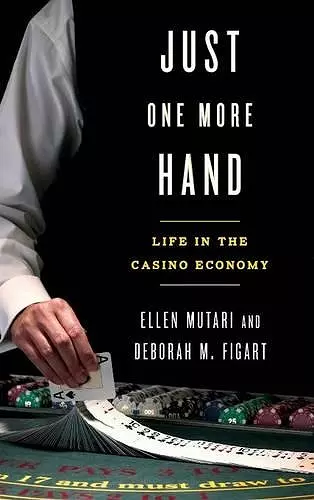Just One More Hand
Life in the Casino Economy
Ellen Mutari author Deborah M Figart author
Format:Hardback
Publisher:Rowman & Littlefield
Published:2nd Feb '15
Currently unavailable, and unfortunately no date known when it will be back

Just One More Hand tells a story that workers all over can relate to: an industry that promised a solid and stable livelihood is being transformed by competitive pressures, causing employees to lose their economic footing. What seemed like a good job one day becomes a bad job the next. Incorporating the real experiences of casino employees, the book demonstrates the difficulties for local communities that are building new casinos in the hopes of luring tourists. Local communities placing all their chips on casinos as an economic development strategy face increasingly long odds. Life stories of individual workers in Atlantic City are explored in the context of the history of the city and the now-global gaming industry. With more and more casinos competing for customers, employees are feeling the brunt of cost-cutting measures, including the wholesale closure of some casinos. While long-time employees are fighting against concessions and wage stagnation, younger workers juggle multiple part-time and seasonal jobs at several casinos. Policy makers hoping to offset these trends are trying to rebrand Atlantic City for a younger, hipper, and more well-to-do clientele using public-private partnerships. Unfortunately, scant attention is being paid to the core issue in economic development—the need for sustainable livelihoods and meaningful work. Here, Ellen Mutari and Deborah Figart explore the realities of the industry and the lives and challenges the workers within it are facing.
Mutari and Figart, labor economists who pronounce themselves 'fascinated by how people earn a living,' examine, in intriguing . . . detail, the struggles of casino workers in the post-recession U.S.. . . .The authors cast their subject as a metaphor for the larger, equally embattled American economic order. Once a thriving industry, casinos are now barely keeping afloat. As a result, many experienced casino workers are desperate for work, a situation presented as microcosmic of an economy in which many industries and governments are cutting costs to survive. The authors share stories of current and former casino employees, such as Laurel, a longtime dealer with a high hourly wage who fears that she's a target for downsizing. They also offer a detailed examination of the industry's changing fortunes, presenting unions as a force for good in employees' lives at a time of rapid change. The authors close on a somber note, sharing their thoughts on the industry's future in light of the possible legalization of online gambling. * Publishers Weekly *
Inspired by a simple question—'Could you build a life working in Atlantic City’s booming casinos?'—Mutari and Figart investigate the complex answer’s very human face. Underpinning their analyses with real-life experiences of casino housekeepers and cocktail waitresses, pit bosses and poker dealers, they find the gaming industry—and the economic footing of its employees—in flux, an apt lens for a new economic order. * Swarthmore College Bulletin *
Ever wonder what life in the casino is like? This fine book tells all, and it does so in the words and stories of the dignified, resourceful and dogged workers of Atlantic City, squeezed ever-more-tightly between a slow economy, corporate cost-cutting and the digital revolution. -- James K. Galbraith, The University of Texas at Austin, and author of The End of Normal
Casinos represent the most lurid face of the service sector, and both a microcosm and a metaphor of a broader economy in which growth has become increasingly unsustainable and the risk of deindustrialization is always just a product cycle away. This vivid, up-close-and-personal look at casino work, the workers who do it, and the communities that host it, is a valuable window on the changing American economy. -- Chris Tilly, Professor of Urban Planning and Director, Institute for Research on Labor and Employment, UCLA
Atlantic City was in decline in the 1970s with businesses closing and unemployment rising when the city bet on casinos to rescue its economy and provide decent jobs for its residents. Even as the early glitter of gambling as an economic development strategy, state and local officials doubled down on their initial bet. Just One More Hand is a masterful tale of the perils of economic development strategy gone awry, told with the analytical skills of two talented economists and seen through the eyes of a diverse group of people who depended on Atlantic City’s casinos for their livelihoods. -- Eileen Appelbaum, Senior Economist Center for Economic and Policy Research; former Professor and Director of Rutgers University's Center for Women and Work
ISBN: 9781442236677
Dimensions: 237mm x 157mm x 26mm
Weight: 558g
280 pages